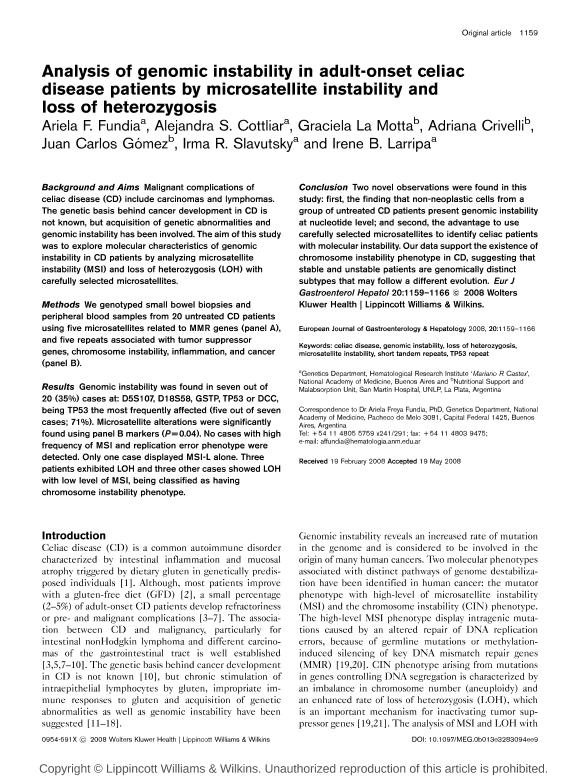Artículo
Analysis of genomic instability in adult-onset celiac disease patients by microsatellite instability and loss of heterozygosis
Fundia, Ariela Freya ; Cottliar, Alejandra S.; La Motta, Graciela; Crivelli, Adriana; Gómez, Juan Carlos; Slavutsky, Irma Rosa
; Cottliar, Alejandra S.; La Motta, Graciela; Crivelli, Adriana; Gómez, Juan Carlos; Slavutsky, Irma Rosa ; Larripa, Irene Beatriz
; Larripa, Irene Beatriz
 ; Cottliar, Alejandra S.; La Motta, Graciela; Crivelli, Adriana; Gómez, Juan Carlos; Slavutsky, Irma Rosa
; Cottliar, Alejandra S.; La Motta, Graciela; Crivelli, Adriana; Gómez, Juan Carlos; Slavutsky, Irma Rosa ; Larripa, Irene Beatriz
; Larripa, Irene Beatriz
Fecha de publicación:
12/2008
Editorial:
Lippincott Williams
Revista:
European Journal Of Gastroenterology & Hepatology
ISSN:
0954-691X
Idioma:
Inglés
Tipo de recurso:
Artículo publicado
Clasificación temática:
Resumen
Background and Aims: Malignant complications of celiac disease (CD) include carcinomas and lymphomas. The genetic basis behind cancer development in CD is not known, but acquisition of genetic abnormalities and genomic instability has been involved. The aim of this study was to explore molecular characteristics of genomic instability in CD patients by analyzing microsatellite instability (MSI) and loss of heterozygosis (LOH) with carefully selected microsatellites. Methods: We genotyped small bowel biopsies and peripheral blood samples from 20 untreated CD patients using five microsatellites related to MMR genes (panel A), and five repeats associated with tumor suppressor genes, chromosome instability, inflammation, and cancer (panel B). Results: Genomic instability was found in seven out of 20 (35%) cases at: D5S107, D18S58, GSTP, TP53 or DCC, being TP53 the most frequently affected (five out of seven cases; 71%). Microsatellite alterations were significantly found using panel B markers (P=0.04). No cases with high frequency of MSI and replication error phenotype were detected. Only one case displayed MSI-L alone. Three patients exhibited LOH and three other cases showed LOH with low level of MSI, being classified as having chromosome instability phenotype. Conclusion: Two novel observations were found in this study: first, the finding that non-neoplastic cells from a group of untreated CD patients present genomic instability at nucleotide level; and second, the advantage to use carefully selected microsatellites to identify celiac patients with molecular instability. Our data support the existence of chromosome instability phenotype in CD, suggesting that stable and unstable patients are genomically distinct subtypes that may follow a different evolution. © 2008 Wolters Kluwer Health | Lippincott Williams & Wilkins.
Archivos asociados
Licencia
Identificadores
Colecciones
Articulos(IMEX)
Articulos de INST.DE MEDICINA EXPERIMENTAL
Articulos de INST.DE MEDICINA EXPERIMENTAL
Citación
Fundia, Ariela Freya; Cottliar, Alejandra S.; La Motta, Graciela; Crivelli, Adriana; Gómez, Juan Carlos; et al.; Analysis of genomic instability in adult-onset celiac disease patients by microsatellite instability and loss of heterozygosis; Lippincott Williams; European Journal Of Gastroenterology & Hepatology; 20; 12; 12-2008; 1159-1166
Compartir
Altmétricas



